Brexit & Beyond Newsletter
15 November 2021
 Welcome to the 15 November 2021 Brexit & Beyond newsletter
Welcome to the 15 November 2021 Brexit & Beyond newsletter
Vice-President Šefčovič and Lord Frost met in London on Friday to assess the ongoing EU-UK negotiations on the Protocol on Ireland/Northern Ireland. Speculation about the UK’s possible use of Article 16 abounds. An array of Brexit-related matters was raised at the NI Assembly, including rhetoric, investment, organic farming, dual market access, and food exports. This week’s newsletter also covers the NI Executive Office’s approach to EU Exit issues, Common Frameworks, and product safety standards post-Brexit.
EU-UK negotiations on the Protocol
Amid much speculation about whether, when, and how the UK Government may use Article 16 of the Protocol on Ireland/Northern Ireland, UK Brexit Minister Lord Frost and European Commission Vice-President Maroš Šefčovič met in London to take stock of ongoing EU-UK negotiations. Šefčovič spoke to the press and took questions on Friday following his meeting, where he welcomed the “change in tone of discussion” with Lord Frost.
Following the meeting, the UK Government’s statement said that its preference remains “to find a consensual way forward”. Earlier in the week, Lord Frost had made a statement on EU relations in the House of Lords, which focused on the Protocol and also touched on issues around fishing rights and the UK’s access to the EU’s Horizon research programme. Frost said, “For now, I wish to preserve the integrity of the negotiations and to remain positive…If Article 16 were to be used, we would set out our case with confidence and spell out why it was wholly consistent with our legal obligations. We would also be ready to explain that case to any interested party, not just the signatories to the treaty but those with a broader interest in relations with the EU and the UK.” He suggested that his EU counterparts should “stay calm and keep things in proportion.” Frost said, “In our view, Article 16 is not inevitable.” He acknowledged that Article 16 “is not an on/off switch for the protocol...There are constraints on what can be done with a safeguard...That is why we find it so difficult to really understand the volcanic reaction that we get to the suggestion of using the safeguards provisions.”
Vice-President Šefčovič held roundtable discussions with NI businesses and civic society on Thursday. He said medicines is the number one issue for stakeholders in NI, and said he would do “whatever it takes to address this in line with what industry tells us”. He suggested a solution on medicines could be a blueprint for solving other issues, adding that an agreement on medicines was “quite low hanging fruit”. Šefčovič said he hoped that “practical solutions will prevail over any temptation at political calculation.” Intensified talks are to take place this week in Brussels, with a focus on medicines and customs. Frost and Šefčovič are set to meet again on Friday.
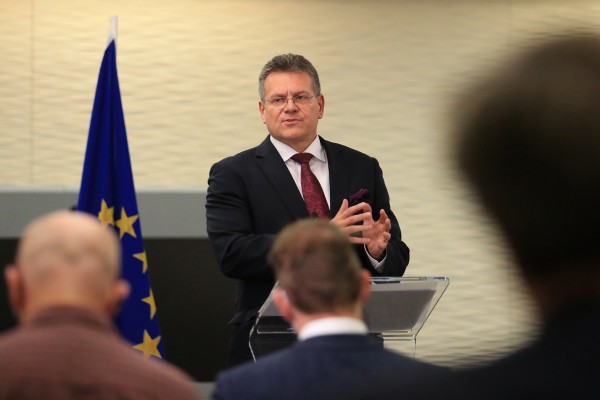
European Commission Vice-President Maroš Šefčovič speaking to the press following his meeting with Lord Frost | Source: European Commission
Further reading and analysis
George Peretz QC has written a Twitter thread on UK Ministers’ legal powers in relation to Article 16. Politico reports on work in the European Commission on retaliatory measures should the UK Government trigger Article 16. These include possibly imposing tariffs on UK exports within a month or the suspension of the EU-UK Trade and Cooperation Agreement. Politico has also published a Q&A on what could happen if the UK triggers Article 16. RTÉ reports on the technical talks, diplomatic contacts between the UK and Ireland, and discussions in Brussels on its potential response.
Brexit at the Assembly
Statements were made in the Assembly on 1 November by Mike Nesbitt (UUP) and Kellie Armstrong (Alliance), and on 8 November by Matthew O’Toole (SDLP) and John Blair (Alliance) to condemn the recent bus hijackings. It has been reported that perpetrators linked an attack to the Protocol on Ireland/Northern Ireland. On 8 November Steve Aiken (UUP) condemned “rhetoric and megaphone diplomacy” from the EU around the Protocol. Jim Allister (TUV) also made a statement on the Protocol. A question for urgent oral answer was granted on 9 November to the Minister for Infrastructure Nichola Mallon.
EU-UK negotiations on the Protocol
At Question Time on Monday 8 November, Junior Minister Declan Kearney (Sinn Féin) outlined contact with UK and EU negotiators Lord Frost and Maroš Šefčovič in October, as well as official-level contact with the Irish Government. Asked whether the Executive has been requested to support the triggering of Article 16, Kearney said, “No; in fact, our officials have advised that matters such as the European Court of Justice…have not been raised with them.” He pointed to surveys from Queen’s University Belfast and the University of Liverpool, which, he said, “indicates that there is general pragmatic contentment with the protocol and a recognition of its necessity.” Kearney said, “There should be no impediment to ensuring that local businesses maximise all of the opportunities provided by the British and European single markets.”
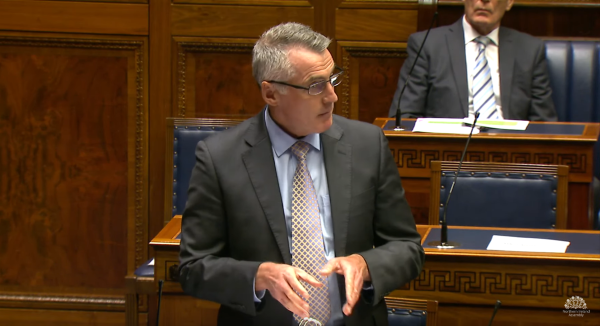
Junior Minister in the Executive Office Declan Kearney | Source: NI Assembly
Investment to NI
Kearney stated that “INI [Invest Northern Ireland] has recorded 50 live enquiries from prospective foreign direct investors interested in investing in the North of Ireland.” This figure compares to an average of around 22 expressions of interest a year between 2017 and 2020.
Post-Brexit funding
The UK Government has published the successful bids for the Community Renewal Fund, £220 million in funding which is the precursor to the Shared Prosperity Fund, which replaces EU funding. Deputy First Minister Michelle O’Neill was asked about the operation of the funds which is being delivered directly by the UK Government. She said, “It undermines devolution, and it is not being delivered in tandem with our Programme for Government, the work that we are doing around recovery or our strategies and plans.”
Food exports
Edwin Poots, Minister for Agriculture, Environment and Rural Affairs, was asked for his assessment of the increased food exports from NI to the Republic of Ireland and the EU. Minister Poots said the increase is “not surprising given the trade barriers that have been put in place between Great Britain and Northern Ireland”.
Checks at ports
The Minister was asked whether, if Article 16 is triggered, he will cease all checks at ports which are required under the Protocol. He said, “I have engaged with my senior civil servants to indicate that they should be looking at the [UK Government] Command Paper that was produced in July as a means of moving forward on this issue. Trading barriers are not to our benefit, and the deployment of highly qualified veterinary staff and environmental health staff in that role takes them away from other important roles.” He noted that “a different set of circumstances relating to live animals pre-existed Brexit and the protocol, and we need to take full cognisance of that as well.”
Logistics and supply chain monitoring
The Minister said that logistics firms have been working on food security and food traceability. He said MLAs would be surprised “at just how good we are at tracing all goods from the factory, during transit right through to their destination.” He said he hopes that, should there be an agreement with the EU, “the EU will be sensible about how best we can protect its single market — it will be able to identify the logistics work that is being done that will greatly assist in that.”
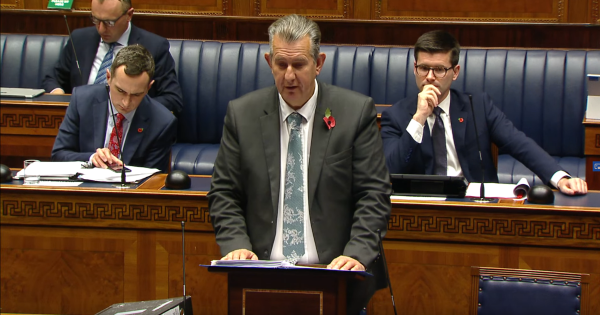
Minister for Agriculture, Environment and Rural Affairs Edwin Poots taking questions in the chamber | Source: NI Assembly
New Zealand trade deal
The Minister was asked about how he will support NI farmers who stand to be negatively impacted by the UK’s recently announced trade deal with New Zealand. Minister Poots had recently criticised the deal. Poots said, “Those places and countries that want to produce things to low environmental standards will find it very difficult to market their products, particularly in this jurisdiction, because the main buyers will not want to acquire those products.”
Organic Farming
Rosemary Barton (UUP) raised the matter of organic farming and supply of feed for organic egg producers. Minister Poots said he was concerned about the organic farming community in NI, which has no local suppliers for much of its products - most imports come from GB for which costs have gone up. He said, “We therefore want to try to ensure that we can get the appropriate relaxations put in place.” He has met with Minister Eustice (Defra) on such issues.
New jobs, Invest NI campaigns
On Tuesday 9 November, Economy Minister Gordon Lyons was asked about the announcement from Almac which is creating 1,000 new jobs and whether it’s an example of NI’s competitive advantage with dual market access. The BBC’s John Campbell points out that Almac has been vocal about what it sees as the benefits of the Protocol. Lyons said the dual access to the UK and EU is “only partial”. Sinead Bradley (SDLP) queried why Invest NI’s website does not mention Northern Ireland’s access to both markets and whether the Minister or his predecessors had a role to play in this decision. Minister Lyons said, “It is absolutely ridiculous that the Member will not even acknowledge the problems that exist with the Northern Ireland protocol”. He said, “I am more than happy to stand over my record and, indeed, the record of my predecessors on attracting jobs and investment to Northern Ireland.”
Justice and security
On 2 November, Justice Minister Naomi Long and was asked how Brexit had increased risks for exploitation of EU workers and how her Department is responding. She said work in disrupting crime and tackling those trying to exploit any loopholes resulting from Brexit is “hugely important” but highlighted that “the policing arrangements, cooperation and future security partnerships that are currently in place have given us a much greater degree of continuity of service across the EU.” Long highlighted her meetings with relevant chairs of European Parliament committees on such issues.
Medicines
The Minister for Health was asked in a written question from Jim Allister (TUV) whether the drug molnupiravir (the first oral anti-viral drug for the treatment of Covid-19) will be available in Northern Ireland in relation to the constraints of the Protocol. Minister Swann responded that the MHRA’s Conditional Marketing Authorisation for molnupiravir is valid in GB only. Emergency use authorisation has been granted for NI and he anticipates that supply will be delivered to NI over the coming weeks. He added that his officials “are working closely with the Department of Health and Social Care (DHSC) to resolve any outstanding issues relating to the implementation of the Protocol, including access to new and innovative medicines.”
Costs of the Protocol
Pam Cameron (DUP) asked the Minister of Justice to detail what the £3.4 million bid in the October Monitoring Round for the Implementation of Protocol on Ireland/Northern Ireland entailed. The Minister wrote that the sum related to costs for the Police Service of Northern Ireland (PSNI), for police officers, police staff, and associated ancillary costs. Minister Long says the total 2021-22 PSNI requirement for costs associated with implementing the NI Protocol is £15.5m.
Written questions and answers from can be viewed on the NI Assembly website.
Committee for the Executive Office – Permanent Secretary briefing
On Wednesday 10 November, Chair of the Committee for the Executive Office Sinéad McLaughlin (SDLP) told the Committee that the co-chairs of the European Parliament UK Coordination Group David McAllister and Bernd Lange would visit the Northern Ireland Assembly today (15 November). The co-chairs met with the Speaker, members of the Committee, and representatives from political parties.
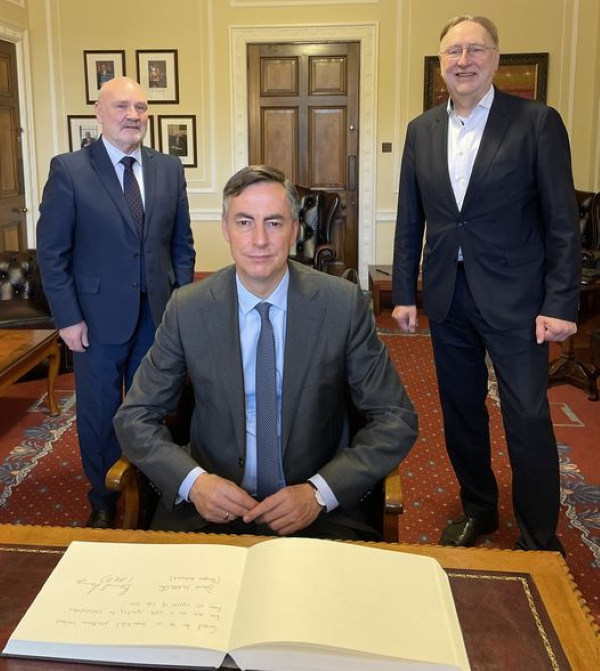
Speaker of the Assembly Alex Maskey with MEPs David McAllister and Bernd Lange | Source: NI Assembly
The new Permanent Secretary of The Executive Office (TEO) Denis McMahon attended the Committee with officials for an introductory briefing. McLaughlin said that the Committee needs more information, such as financial or economic analysis, from TEO on Brexit and the Protocol’s impact if it is to be able to do its job properly: “positive or negative, we have no data,” she said. McMahon said that a lot of the data comes from individual departments and interpreting it can be challenging. McLaughlin requested an economic briefing on the impact of Brexit and the Protocol to-date. An official working on EU Exit said previously such information on GB-NI goods movements didn’t need to be collected. The department has been looking at HGV movements data, and CSO data on North-South trade, and is happy to look at what could be provided.
Christopher Stalford (DUP) highlighted that that the Minister for Agriculture has told his officials to make the necessary preparations should Article 16 be invoked, and asked whether similar work is happening at TEO. McMahon said that at official level, “We’re always keeping a very close eye on possible contingency planning issues that we need to address and this is obviously on of them…we are making arrangements as best we can to look at a range of scenarios.”
Common Frameworks reports and scrutiny
UK Government reports
On 9 November, the UK Government (UKG) published the twelfth European Union (Withdrawal) Act and Common Frameworks statutory report which details the progress on the development of Common Frameworks. Common Frameworks aim to ensure a common approach is taken in areas which were previously governed by EU law and which intersect with areas of devolved competence. The number of provisionally confirmed Common Frameworks stands at 29. The Government also published the Frameworks Analysis 2021, a breakdown of these areas.
The report states that work has been ongoing “to ensure that Common Frameworks satisfactorily take account of the operation of the Protocol where it is relevant to specific Frameworks. Common Frameworks are one of several mechanisms which will enable divergence arising from the implementation of the Protocol to be managed appropriately.” The report also notes work with devolved administrations “to determine a mechanism for agreeing exclusions from the market access principles in the UK Internal Market Act.”
The fourth Frameworks Analysis paper sets out progress and a number of changes since the last paper in September 2020. Some policy areas have been merged and the number of policy areas not requiring a framework has increased from 115 to 120. Several frameworks have been re-categorised as not requiring primary legislation. The Government has decided that a Framework between NI and GB for Equal Treatment legislation is not required “due to the shared international obligations that GB and Northern Ireland are subject to.” The paper also gives a rational for each of the 120 policy areas where no framework is considered to be required.
Parliamentary Scrutiny
Four Common Frameworks on transport policy areas were recently submitted for parliamentary scrutiny. The provisional Frameworks on Driver Licensing, Rail Technical Standards, Commercial Transport and Operator Licensing and Motor Insurance have been published on the UK Government’s website. The provisional Framework on Public Health Protection and Health Security has also recently been published. The Committee for Infrastructure on Wednesday 10 November heard evidence from Department for Infrastructure(DfI) officials, while on Tuesday 9 November, the Lords Common Frameworks Scrutiny Committee took evidence from officials at the UK Department for Transport(DfT) on the transport Frameworks.
Officials told the committees that rail systems in GB and NI have evolved quite differently over time. The setting of technical standards is mostly reserved power for Westminster, but technical specification notices issuing in London will apply to GB only. For Northern Ireland, EU technical specification notices will continue to apply and the rail framework is designed to recognise that. A DfI official pointed out that trade in rail components between GB and NI is quite small, so it’s not anticipated there would be a significant impact if there is divergence.
DfT officials said they had good working relationships with officials in Belfast, this was confirmed by officials from DfI. DfT said that there has also been a lot of work at technical level between NI Railways, Translink, and the Rail Safety and Standards Board (RSSB).
It was noted that the Minister for Transport has introduced changes on the rules for driver licencing to address HGV driver shortages. Northern Ireland is not changing its rules, and dialogue is ongoing, for example regarding how this could affect GB drivers taking their test in Northern Ireland. DfT officials gave details about how divergence would be monitored, and the process for proposals for GB to diverge from EU rules, confirming there would be a ‘full audit trail’ for divergence and that Parliament will be informed of proposals.
Some members in the Committee for Infrastructure raised what they see as a ‘democratic deficit’ in the Protocol and asked how local suppliers and the department could input into new EU regulations. DfI officials said that work is ongoing to develop the Joint Consultative Working Group process, and DfT would engage with stakeholders when the EU brings forward proposals. A DfI official said that The Executive Office (TEO) considered a paper on managing divergence, and TEO and departments are working on a process “to try and develop a form of engagement whereby, if there are any items of concern that…the Northern Ireland Executive and Northern Ireland Assembly has the ability to feed that in.”
Product standards and ‘unfettered access’
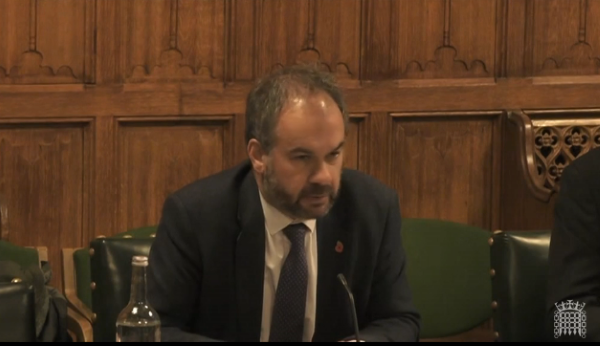
Paul Scully, UK Minister for Small Business, Consumers and Labour Markets at the European Scrutiny Committee | Source: UK Parliament
Paul Scully, UK Minister for Small Business, Consumers and Labour Markets gave evidence to the European Scrutiny Committee on 3 November 2021 on product safety in the UK in relation to the Protocol. Scully suggested that the UK Government’s proposals in its Command Paper of a dual regulatory regime (whereby goods which met either UK or EU rules could circulate freely in NI) would ensure NI consumers don’t face barriers in accessing goods from GB. Concerns were raised in the committee about Northern Ireland potentially being used as a ‘back door’ for EU goods to enter the UK internal market. Scully said there are certain anti-avoidance provisions in place for goods originating in the EU to deter those who wish to avoid customs formalities. CEO of the Office for Product Safety and Standards Graham Russell said product safety risks would only really come about where there is divergence in safety standards between the EU and UK. The proposed EU machinery directive will be the first test of divergence. Scully said, “there are clearly opportunities, not least under the Command Paper proposals, for Northern Ireland to act as a bit of a hub looking both ways”, an argument which has also been made more widely by the EU and others about the current Protocol.
On unfettered access for NI qualifying goods, and how this will be secured, Scully said it’s “a problem we have to square”. Scully said there was a delay to the qualifying goods legislation (under which only businesses established in NI would benefit from unfettered access to GB) as EU-UK talks are ongoing. Russell pointed to the unfettered access provisions for NI goods in the UK Internal Market Act and said there is no intention for that to become a back door – there may be requirements such as labelling traceability, market surveillance. Further information about the new product safety rules and markings can be found here.
Other news
- On 9 November, Chairs in the US House of Representatives released a statement on the Protocol, calling on the UK not to invoke Article 16 and “to commit to implementing the Northern Ireland Protocol in full.”
- The Institute of Irish Studies at the University of Liverpool has published the results of its survey on the Protocol on Ireland/Northern Ireland, which was carried out mid-late October. It finds that the Protocol is only a top priority for 9.1% of respondents, with health, Covid recovery, and the economy the most pressing issues for respondents. Professor Peter Shirlow, who led the study, said, ‘We find evidence of inter-community consensus, with consent achievable when negotiations/discussions explore - and more importantly - offer alternative practical resolutions.”
- At the Committee for the Executive Office on 3 November, the Chair informed the Committee that Lord Kinnoull and Sir Oliver Heald (who are tasked with making arrangements for the UK’s delegation to the EU-UK Parliamentary Partnership Assembly (PPA)) have met with the chairpersons of relevant committees of the UK’s devolved legislatures. The devolved legislatures have written regarding their involvement in the PPA, and have discussed options for observer status.
- Bloomberg reports that the UK has changed its methodology for the impact assessment of its free trade deal with Australia, after the initial study showed it would negatively hit Northern Ireland. Trade pundits ponder the motives for the new analysis.
- European Commissioner for Financial Services, Financial Stability and Capital Markets Union Mairead McGuinness announced that she will propose the extension of the equivalence decision for UK-based central counterparties(CCPs). Pre-Brexit, London became the main financial hub for the trading and clearing of derivatives in the EU.
The Week Ahead
- Monday 15 November, 2pm – Plenary - Question Time - The Executive Office
- Wednesday 17 November, 4pm - Committee for The Executive Office - Oral Briefing from Assembly Research: UK Approach to the Ireland/Northern Ireland Protocol
Catch up with Assembly Business
- Wednesday 3 November, 2pm - Committee for The Executive Office - Head of Northern Ireland Civil Service - Oral Briefing
- Thursday 4 November, 10.05am - Committee for Agriculture, Environment and Rural Affairs - EU Exit legislation – written briefing
- Thursday 4 November, 11.35am - Committee for Health - EU Exit legislation
- Monday 8 November, 2pm – Plenary - Question Time - Executive Office; Agriculture, Environment and Rural Affairs
- Tuesday 9 November, 2pm - Plenary - Question Time - Economy
- Wednesday 10 November, 10.15am - Committee for Infrastructure - Department Briefing on Common Frameworks: Rail Technical Standards, Commercial Transport and Operator Licensing Standards and Motor Insurance
- Wednesday 10 November, 2pm - Committee for The Executive Office - Permanent Secretary Introductory Briefing
- Thursday 11 November, 11.20am - Committee for Agriculture, Environment and Rural Affairs - EU Commission's "Fit for 55" Package - Written Briefing from DAERA



